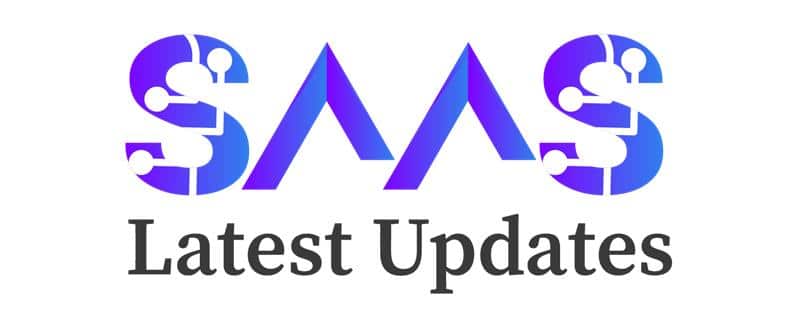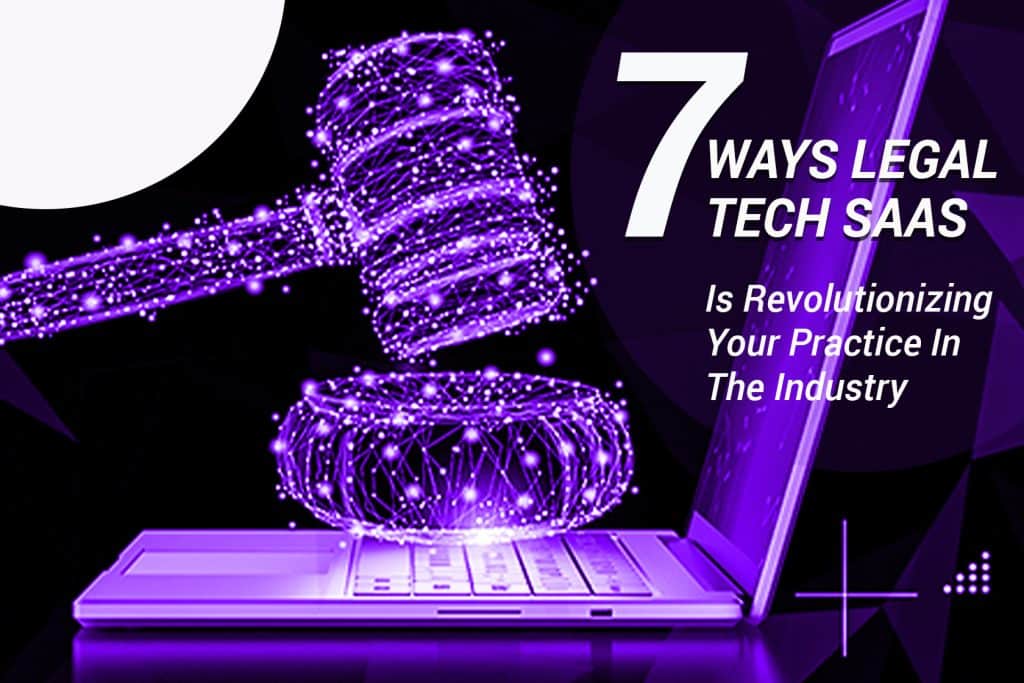In the legal world, technology is changing everything. This revolution is essential if you want to stay ahead of the competition. In recent years, the legal industry has seen the integration of innovative technology. Legal Tech SaaS is one of the solutions that is transforming your legal practice.
In this blog, we will explore the effect of using tech SaaS instead of traditional practices in the legal sector. Read on to see how legal professionals can use different legal tech SaaS tools to their benefit.
30-Second Summary
From client services to billing, legal tech SaaS solutions are becoming prevalent. These tools are making things smooth for law practitioners. Do you want to know how?
This blog outlines the significant impact of technology on the legal world. Learn about automation and remote legal tools that are shaping the future of the legal industry in this blog.
What is Legal Tech SaaS?
Before moving forward, let’s clear up what legal tech SaaS is. This software is hosted on the cloud and utilizes a subscription model. That means that you have to pay a certain amount every month or year to access it.
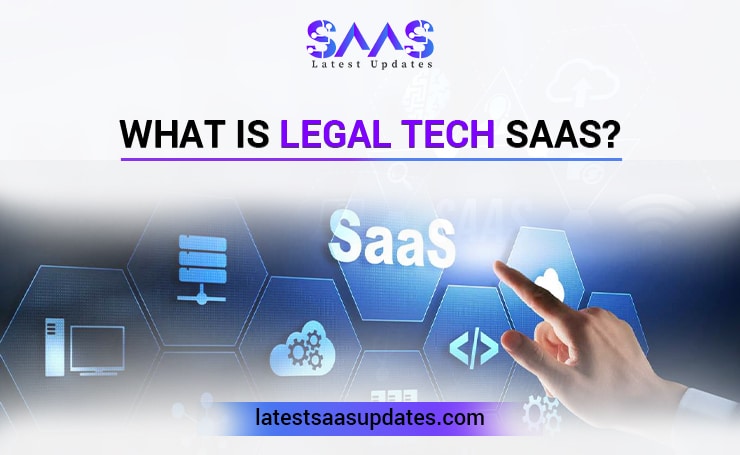
It helps lawyers, legal consultants and legal operations teams to streamline the workflows of their practice. Legal professionals can use this software on any device via an internet connection.
The Impact of SaaS on the Legal Industry
The power of supercomputing, which was once available only to larger corporations has taken the form of cloud computing. It is becoming prevalent in small law firms as well. Incorporating SaaS in the legal industry saves costs and the hassle of installing on-premise software infrastructure.
Impact on Law Efficiency
Imagine you have to process data of several terabytes in your law firm. If you have an on-premise infrastructure, it might have limited capacity. To process the remaining data, your organization will either buy and install additional hardware or outsource the job to a service provider.
In both cases, the cost and lack of control make your job harder. On the other hand, legal tech SaaS caters to the different needs of different law firms. The processing of multiple terabytes of data will only take hours instead of weeks. In conclusion, SaaS is making your legal practice more efficient.
Impact on Collaboration
Collaboration is key when it comes to the legal department. Legal practitioners are in contact with fellow lawyers, clients and opposing counsel. With the rise of legal tech SaaS, collaboration in the law industry is changing.
You do not need to have different communication applications. You also do not need to sit in front of a specific desktop to access the on-premise software. You can chat, share files, and even comment using SaaS technology. Using document management SaaS has made collaboration smooth.
Impact on Client Service
Legal tech SaaS has significantly impacted client service as well. In the legal industry, satisfactory client service is an essential pillar. The SaaS software automates recurring tasks and frees lawyers to focus on client interaction.
Your clients can access documents and files you share with them on the cloud platform. It fosters a transparent lawyer-client collaboration. Moreover, you can benefit from secure messaging features and client portals. They build trust and satisfaction for your clients.
Challenges of the Legal Industry
The legal industry is facing numerous challenges in this evolving technological era. There are still traditional ways around that hinder the potential for growth.

Read on to see what these challenges are:
Outdated Processes
Numerous law firms still struggle with old legacy systems and outdated processes. They hinder efficiency and productivity.
Legacy systems resist the incorporation of modern technology, hindering information flow. This hindrance creates silos within the firm. For agile workflows, it is essential to integrate legal technology.
Data Breaches
The legal industry has all the sensitive information of clients. This sector is facing cybersecurity threats and the risk of data breaches. Hackers and other cybercriminals target these law firms due to the confidential data they store.
Outdated technology and a lack of employee training make your law firm an easy target for these criminals. It is a significant challenge to have strong cybersecurity for law firms.
Remote Work Limitations
Remote work accelerated during the pandemic. However, it became a challenge for traditional law firms. The use of on-premise infrastructure and inadequate tools did not support a hybrid or remote work model.
Additionally, it affected team and client communication. The combination of remote work and seamless collaboration is still a significant concern for a lot of law firms.
Evolving Compliance Regulations
Regulatory standards and compliance requirements constantly change in the legal industry. Evolving with these regulations is a challenge for many law firms.
Regulatory frameworks, such as privacy laws and data protection regulations, need more technological resources.
Cloud-Based Legal Solutions
There are some technological tools that are becoming famous in the legal industry. They are revolutionizing this sector with their advanced features.
- Document Management Solutions
These solutions organize and store data in a central hub. Document Management Solutions (DMS) is revolutionizing the traditional paper-based practices. You can group documents in the software on the basis of clients and criteria.
Moreover, DMS uses a secure cloud model. It is perfect for storing sensitive legal documents. It allows you to change documents and keep an audit trail of these modifications.
- Case Management Software (CMS)
CMS in the legal department is excellent for streamlining and centralizing all case-related data. The case information includes client contacts, deadlines, tasks and court dates. Finding everything in one place makes your tasks efficient.
With this tool, you can automate your tasks. You can automatically generate reminders for deadlines and events. Report generation tracks KPIs to improve strategy development.
- Contract Management Platforms (CMPs)
CMPs manage an organization’s contract life cycles. It has multiple features to optimize the contract process. You can automate various stages of the contract life cycle for a smooth flow. From beginning to end, these platforms facilitate the entire process.
You do not have to draft the contract again with CMPs. They have pre-approved clause libraries with customizable contract clauses. Additionally, these tools use analytics to highlight risks and obligations in a contract.
- eDiscovery
This tool is an ideal way to manage electronic legal data. It handles data important for legal proceedings. Moreover, it gathers information and analyzes it thoroughly. The data includes emails, documents and other digital information.
If you want to cover the potential evidence, this tool is perfect. It collects relevant data for your case and analyzes a large volume of information.
- Virtual Data Rooms
Virtual Data Rooms (VDRs) are secure platforms. They are used to share sensitive information. You can use it during business deals and share due diligence, mergers, and other documents under strict confidentiality.
You can set access controls on the documents, including specific permissions to certain parties. VDRs also maintain audit trails and track every action you perform in the system.
- Client Relationship Management (CRM) Systems
Legal CRMs foster trust and build relationships with current and potential clients. It keeps a record of client interaction, including calls, messages and meetings. The lead tracking feature manages leads in the pipeline and converts them into clients.
These tools also facilitate your marketing efforts. These are perfect law firm collaboration tools. You can even get insights into customer behavior and preferences for personalized interactions.
- Billing and Timekeeping Software
Billing and timekeeping software manage your law firm’s expenses, invoicing processes and billable hours. One such software is CaseFox. These tools have timers, detailed time entries and task categorization to track billable hours.
You can also track expenses related to cases and client work. On the basis of expenses and billable hours, you can generate invoices.
Digital Transformation in Law
Using SaaS for law firms has significantly digitalized the legal world. Now, law firms operate smarter by using data and analyzing it on digital platforms. Apart from information, legal professionals ensure transparent and convenient interaction with clients using these tools.
According to research from Thomson Reuters, 83% of professionals think that digital transformation is extremely important for a firm’s strategy.
Benefits of Law Firm Digitization
Incorporating legal tech SaaS in your legal practice serves multiple benefits:
- Digital platforms leave less room for human errors as it doesn’t rely on manual data.
- These platforms make it easy to quickly access important documents using the internet.
- Online portals and chatbots provide 24/7 assistance, providing a personalized client experience.
- The use of sophisticated AI search engines provides access to a large volume of information online.
Examples of Digital Platforms for Law Firms
Let’s have a look at legal tech SaaS platforms that are becoming important in this field.
Enterprise Legal Management software
If you want all automation and analytics systems under one umbrella, this tool is perfect. One example of ELM is LawVu. It stores and organizes data into clusters. You can easily search for any information you want using this digital platform.
Generative AI
Generative AI has disrupted and transformed the landscape of law. This sector has its reservations about genAI. However, it makes your tasks easy. Generative AI can complete the majority of tasks within a short time frame.
E-Notary Software
E-notary is one of the remote legal work tools that allows you to collaborate with anyone regardless of geographical boundaries. This digital platform takes measures to verify and grant access only to authorized users. The electronic journal feature streamlines your workflows.
Legal Practice Management Software
Legal practice management software (LPM) is specialized for law firms. Legal practitioners can centralize, organize, and protect their firm’s processes. This software has communication, data storage and time tracking features.
The following benefits make it a comprehensive platform for every legal professional.
- Lawyers get a seamless workflow.
- Clients get an excellent experience.
- Law firms get improved operations and business steps for growth.
What does LPM do?
This software assists in every step of a firm’s caseload. From lead management and cyber security to client communications, it handles everything.
It manages detailed work, such as tracking billable hours and onboarding new clients. It not only stores the data but also organizes it for a hassle-free experience.
Additionally, you do not have to worry about data breaches. It is compliant with client confidentiality. It also consolidates your firm’s entire workload into one system, making each task more manageable.
Who Uses LPM in a Law Firm?
This software provides solutions to every professional in the legal industry.

Lawyers: It helps in centralizing all data, including time tracking, accounting and client communications.
Paralegals: It assists in document management, client intake, e-payments and deadline management.
Firm leadership and management: You can pull insight reports, manage leadership tasks and manage user permissions.
Finance and accounting staff: It can create accurate financial reports, ensure proper reconciliation and manage client funds.
Factors to Consider Before Choosing LPM
- Law firms should consider the benefits of using legal tech SaaS platforms, such as LPM.
- Firms should choose LPM platforms that fit their budget.
- You should consider the intuitive interface of LPMs before implementing them.
- Assess the vendor’s reputation before investing in this legal tech SaaS platform.
- Law firms should only choose the platform that evolves with their business.
- Make sure that the LPM you are choosing flawlessly integrates with your existing system.
Automation Tools for Legal Operations
Legal automation tools are a type of legal tech SaaS, changing the functions of the legal industry. From automation to measurement, these tools assist legal tasks for increased efficiency.
Top 5 Legal Automation Tools
As this sector is shifting toward technology, these 5 tools will help you make a smooth transition.
Percipient: This AI contract reviewer handles a large number of contracts.
DocuSign: Makes sending, signing, and managing documents easy digitally.
MyCase: Handles task assignments, reminders and client communication, etc.
Filestage: A collaboration tool that provides a quick way to review and approve documents.
CheckBox: Simplifies how teams process and manage legal requests.
Remote Legal Work Tools
Working remotely comes with struggles. However, the right remote legal work tool can make all the difference.
Top Legal Tech SaaS Remote Tools
We have listed important remote tech SaaS tools that can assist you.
WiseTime: A legal time tracking tool.
Clio: A legal practice management software.
QuickBooks: A billing and accounting tool for law firms.
HighQ: Perfect for document management and collaboration.
Legaler: Ideal for hosting secure virtual meetings.
Everlaw: Manages e-discovery and controls costs for complex litigation.
What is The Future of Legal Tech SaaS?
Cloud-based SaaS solutions are the future of law firms. Their use increased in 2019, when the COVID-19 pandemic began to spread globally.
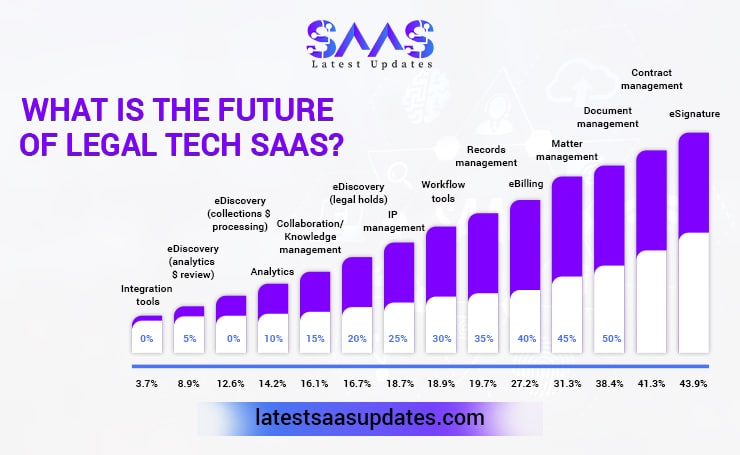
You can look at the chart below, which reflects how work from home brought the digital transformation in law, based on the 2019 Global Legal Department Benchmarking Report.
Let’s have a quick look at how SaaS for law firms has and will be revolutionizing in the upcoming years based on the valid statistics:
- Right after shifting towards remote work, the use of cloud-based legal SaaS reached up to 37%.
- The global legal tech market reached US$ 26.7 billion by 2023.
- The Global SaaS market, which is predicted to grow rapidly, with an anticipated revenue of $390 billion by 2025, is also said to increase its revenue by 2029, at a rate of 19.4%.
- The global legal tech market, which reached $26.7 billion in 2023, is projected to reach $55 billion by 2029.
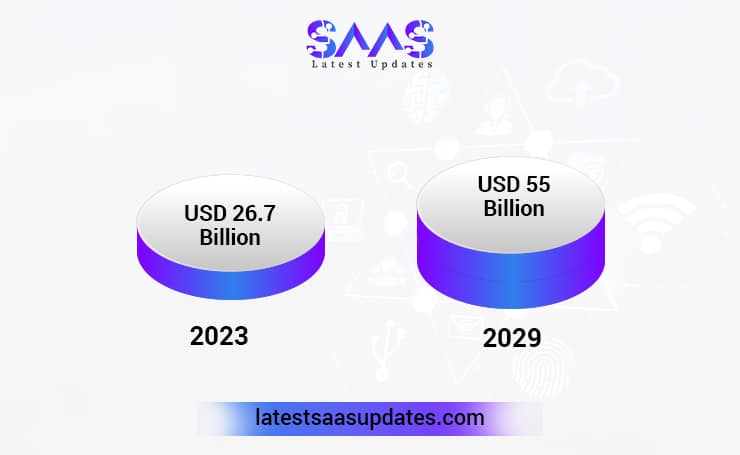
- Due to the rise of AI integration in every industry online. In 2025, the legal-tech startups received almost $1 billion in funding.
SaaS Legal Industry Trends 2025
Legal tech SaaS is the future of the law industry. It has become an indispensable part of the majority of law firms. In this section, let’s discover the SaaS legal trends of 2025.
- AI is transforming all industries, including law. From contract reviews to case predictions, expect AI to be a part of these processes.
- Data privacy is getting stricter. In 2025, sensitive information is safer than ever.
- The transparency that comes with using legal tech SaaS results in client satisfaction.
- Legal professionals can navigate complex regulatory processes with RegTech.
Conclusion
The law industry is experiencing a major shift from traditional practices to digital transformation. The use of legal tech SaaS tools is making tasks easier to manage. Despite challenges, many legal professionals are accepting this change and the convenience it brings.
With the best Legal Tech SaaS software with updated AI and legal integrations, legal firms can gain drastic growth in their online business, which can remain consistent with ongoing updates, training, and learning of Legal Tech SaaS by the law firms.
For more SaaS related information, feel free to explore Latest SaaS Updates.
Frequently Asked Questions
- What is Legal Tech SaaS?
Legal Tech Saas is an online subscription-based software service that helps law firms run their legal operations digitally, including billing, client management, automation, and case management.
- How does SaaS benefit law firms?
SaaS helps legal firms to manage their legal operations on a unified platform without having to do a lot of paperwork, and schedule appointments for physical meetings with their clients.
Cloud-based legal SaaS is also secure, cost-effective, and efficient, helping SaaS lawyers to use web-based access to clients and case management, making their legal services management easier.
- Is Legal Tech SaaS secure for client data?
Yes, Legal Tech SaaS uses proper encryption and compliance practices, ensuring the security of client data and personal information.
- Can small law firms use Legal SaaS tools?
Yes, Legal SaaS tools like Clio and PracticePanther, etc., cater to solo legal firms as much as they cater to medium to large-sized firms. Legal firms can scale their Legal Tech SaaS tools resources based on their requirements whenever required, with the increase or decrease in their business size and requirements.
- Which is the best SaaS tool for law firms?
Choosing the best tool totally depends on the size and requirements of the firm, but when it comes to recommending the best SaaS tools, we provide five recommendations, including Clio, PracticePanther, DocuSign CLM, NetDocuments, and Lawcus.
- How is AI used in Legal Tech SaaS?
AI can assist lawyers and legal firms using cloud-based legal SaaS by automating their regular legal practices like document review, legal research, and client intake, helping lawyers save time and make data-driven decisions. But the lawyers must be trained to use the AI in an ethical and the best way possible, otherwise the leverage can always turn into a negative impact when done wrongly.
- Why is Legal Tech SaaS the future of law firms in 2025?
Legal Tech SaaS is the future of law firms in 2025 and beyond because the digital transformation of law firms will not stop at its current state, AI is revolutionizing the internet, customers are becoming more aware of their legal rights, and they go firm to firm to find the best one to resonate with them.
